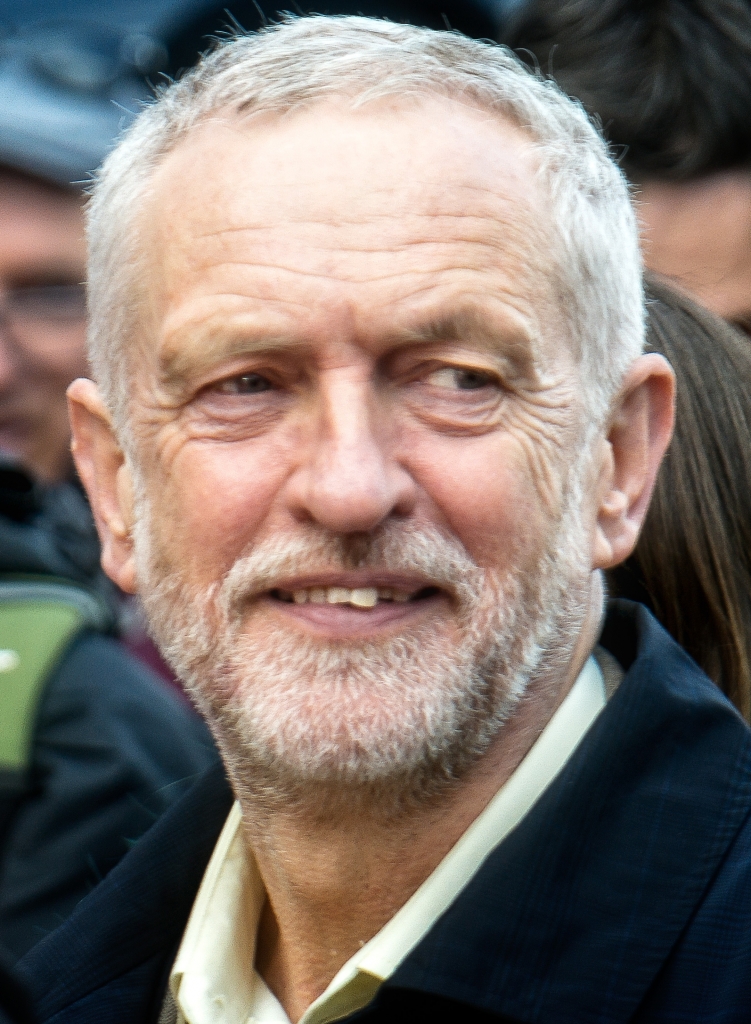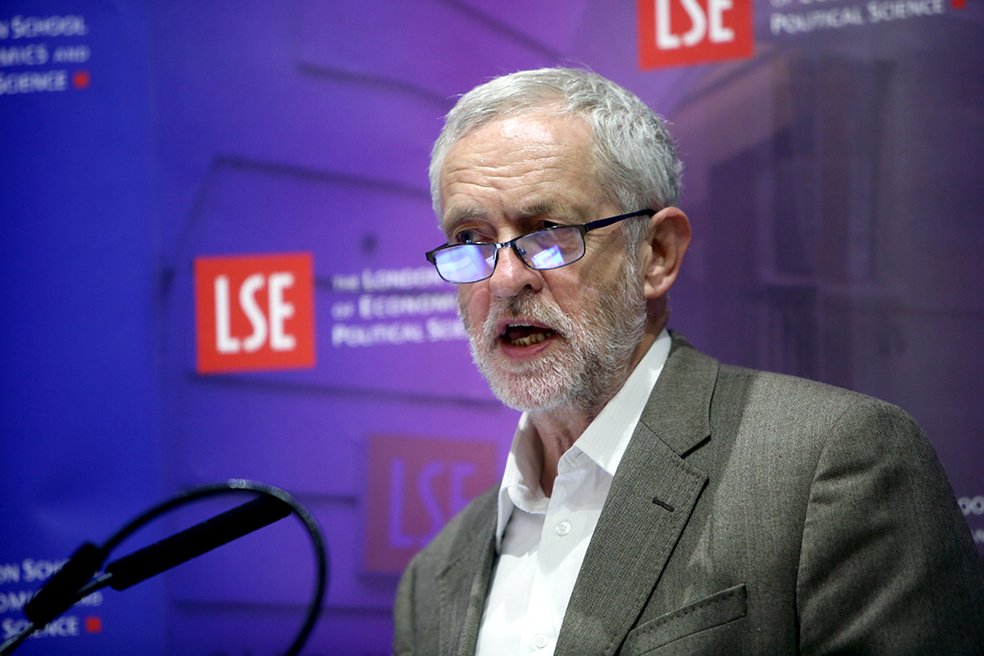 Talking at an LSE event, Jeremy Corbyn set out his views on how the Labour Party can rebuild the politics of hope. By explaining how faith in politics was lost, he explained how that faith can be restored, how it also requires economic justice and credibility, and how Labour can promote the core idea behind socialism: that everyone should care for everyone else.
Talking at an LSE event, Jeremy Corbyn set out his views on how the Labour Party can rebuild the politics of hope. By explaining how faith in politics was lost, he explained how that faith can be restored, how it also requires economic justice and credibility, and how Labour can promote the core idea behind socialism: that everyone should care for everyone else.
To me, the starting point of socialism is not economic structures. It derives from a philosophy that everyone should care for everyone else. That is not exclusive to socialism, it is the philosophy at the heart of all of the world’s major religions. Socialism is about delivering the political programme to put that into practice: to create a society in which socially, and economically, we can ensure everyone is protected and cared for.
The demand for a fundamental shift in ownership and power in society that Ralph Miliband argued for is about making that a reality. But public’s faith in politics to change society, to improve people’s lives, has been fundamentally shaken. To rebuild the politics of hope, we have to restore that confidence.
When talking about the post-war era of politics Tony Benn said: “Democracy transferred power from the wallet to the ballot. What people couldn’t afford for themselves they could vote for instead”. Tony understood that it was democracy that unlocked the potential for socialist politics to deliver, and his generation did. It was especially the radical Labour government of 1945 that delivered so many of the social achievements of which we Labour members are so proud: the NHS, the welfare state, council housing, comprehensive education, institutions that were about the collective improvement of all.
This confidence that politics could change lives for the better was so powerful it endured, largely untouched, through successive Labour and Conservative governments in the 1950s, 60s and 70s. In that era too, elected government – centrally or locally – was responsible for running things: the railways and buses, electricity and gas, and other utilities like water and telecommunications.
Government had an industrial strategy: it stepped in to support strategic industries or businesses if they needed support, whether that was nationalising Rolls Royce under the Conservative administration of Edward Heath, or the proactive investment in technology of the first Wilson government. And as a trade union official in the AUEW, I advised Tony Benn in the second Wilson government on the nationalisation of shipbuilding and aerospace.
That era ended with the individualistic and neoliberal creed of the Thatcher government, which systematically dismantled the institutions of collective power and administration. Trade unions were shackled by what became the most restrictive anti-union laws in Europe. Local government was constrained and many of its functions forcibly outsourced. And central government was removed from administering much at all as Thatcher rolled back the public realm.
This latter point was an abdication of political and economic responsibility. Instead of previous governments seeing full employment as a fundamental responsibility, the Thatcher government saw unemployment as a cause for individual blame. Norman Tebbit’s “get on your bike”; Peter Lilley’s “little list”; and John Major’s exhortation to “condemn a little more and understand a little less”, were all about diverting responsibility for social failure from government to individuals.
There was more to this than mere moralising too. The Conservative governments systematically dismantled public services and the tax base that underpinned them. Massive tax cuts, particularly for wealthy individuals and corporations meant worse public provision for all. And so the use of public provision – whether in housing, social security or transport – was deemed to be illustrative of a personal failure, as Thatcher said about anyone riding a bus over aged 25.
This wasn’t just a phenomenon in the UK but in the US driven by Reagan too. The maxim of Judge Oliver Wendell Holmes “I like paying my taxes, with them I buy civilisation”, was replaced by “greed is good”. The economics of Milton Friedman – what became the neo-con agenda – so ruthlessly and brutally tested in Chile, dominated in the US. People lost faith in the idea of government supporting their aspirations.
I am not talking here about the aspiration of the delusional Del Boys – “This time next year Rodney, we’ll be millionaires” – not the importation of the individualist American Dream. (As an aside, the US comedian George Carlin once said “They call it the American Dream, because you have to be asleep to believe it”.) But real aspiration is the aspiration for a secure home, a secure job, a productive job that satisfies and enriches life, the security of knowing your loved ones will be well cared for when they get old or fall sick, the security of knowing your children, nieces or nephews will attend a good school, the aspiration to know your family, friends and neighbours are getting on OK too, and that you have the time, opportunity and the facilities to enjoy some decent leisure time.
These are the things that make the good life and democratic government has both the responsibility, and the capacity, to guarantee them. A government that runs as little as it can get away with has no industrial strategy, has privatised key parts of the economy necessary for a decent life, has abdicated its social and economic responsibilities.
People will not trust, and will not have faith in a government that abdicates its responsibilities through privatisation, deregulation and neglect. People know that to change things you need power when government appears powerless to change things. People won’t have faith in it to change things when government gives its powers away. People lose faith in it.
I rebelled against the New Labour government several times – several hundred times – because, among many good things that government did, I was convinced some of its actions and inactions reinforced the Thatcher agenda and inheritance. And the period New Labour undermined trust too. New Labour was often unfairly tarnished with the label ‘spin’ – it spun no more than its predecessor governments, or indeed its successors. But it did go to war on a falsehood. We don’t need the Chilcot report in a few weeks’ time to tell us all what we know. There were no weapons of mass destruction in Iraq, there was no ability to attack within 45 minutes, and the deal had been done with President Bush well in advance.
Labour was also in office when the MPs expenses scandal broke. Politicians from all parties were implicated in unethical and sometimes outright illegal behaviour. It provided clear evidence for the cynics: ‘politicians are all in it for themselves’, ‘they don’t care about us or about creating a better society, they care about themselves’. Huge damage was done to all politics.
As someone who has spent 33 years in Parliament, let me be clear: I don’t think it is true that all or even most politicians are in it for themselves, but the perception is real, and as elected politicians we have a duty to challenge it, not just in our words, but in our actions too – and that is the fundamental failure.
But perhaps the biggest event, of recent times, to damage confidence in politics was the banking crash. A global banking crash that happened under a Labour government and that unleashed the most profound economic crisis since the 1930s. The bailout was necessary to avoid a much bigger fallout, but the opportunity for systematic change was missed. Politicians were too cautious, too unambitious, too lacking in vision to see the opportunity for fundamental reform … the sort of fundamental reform that great governments do.
Banks were part-nationalised but not used as motors of investment and essential economic change. People felt that the banks were bailed out while they were suffering. They felt excessive greed had been allowed to fester unrestrained, and people felt government was reactive, not proactive. And too passive. This was reflected in the clear trend of decline in voter turnout at general elections. An increasing share of the population – those who grew up under Thatcher and Major particularly -who saw no hope in government and didn’t bother to vote.
This was rational. They didn’t believe politicians either could or would change things in any substantial way. They didn’t see that politics could improve their life. So they didn’t vote. And people lost faith in Labour because we conceded too much ground to the Conservatives.
Let me give just two examples. Firstly, on the welfare state, which I am proud to defend. Labour created the social security system to defeat poverty, homelessness and destitution, and we much to defeat those injustices. But we were too timid. The opinion polls told us people didn’t like welfare so we didn’t make the arguments.
I say this as a general point. Opinion polls should not make policy; they should inform strategy. They tell you where public opinion is at the present time. As a political party, as a Labour movement, we have to decide whether we to bolster that view or to challenge that view. If the government of Harold Wilson had received pollsters’ advice in the 1960s, then it would never have scrapped the death penalty, legalised homosexuality, legalised abortion.
As Harold Wilson himself said, “The Labour party is a moral crusade or it is nothing.” So I am proud that two of the biggest reversals we have achieved under our leadership have been stopping the tax credit cuts that would have been introduced in April and have taken an average of £1,000 away from 3 million families. And then stopping the cuts to Personal Independence Payments for disabled people in the Budget this year – over £4 billion that the government disgracefully planned to take away from disabled people.
Secondly, on immigration, we must stand up to the divisive rhetoric of UKIP – and increasingly of the Tories – and be clear in saying that it is this government’s cuts that are putting a strain on public services. This again is another risk if politics fail, if politicians fail to deliver a decent society, and fail to create opportunities for all then feelings of frustration and alienation can grow. And those feelings can easily be manipulated by the divisive politics of xenophobia and hate.
Speaking in a lecture series dedicated to Ralph Miliband – himself a refugee – this seems an important point to make.
Rebuilding hope
The politics of hope are not an inevitable reaction when politics fails. The politics of hope have to be rebuilt. It has taken social movements to do that. Movements like those in Latin America, like those sweeping across southern Europe, and that is shaking up the Democrat race in the US.
In the UK, we face a Conservative government bearing many of the hallmarks of the Thatcher governments: a determination to roll back the state, to cut taxes on the richest and on corporations, and to attack trade unions. A government that is unprincipled and unashamed to play the politics of division, demonising people on welfare as ‘scroungers’ and ‘shirkers’; referring to people fleeing persecution as “a swarm” or “a bunch of migrants”.
They sought to abdicate their responsibilities when it came to the crisis in the steel industry, and it was only concerted pressure from the trade unions, from Labour MP and from the steel communities that forced the government to change position. So while their intentions are ideologically identical to the Thatcher government to roll back the state, this is a government that can be rolled back. Because they are out of sync with mainstream public opinion, their policies are unpopular, and people can see that the Labour opposition is standing up to them.
Since I became Leader I’ve had several conversations with Ed Miliband, I value his counsel and advice. Ed understood that trust had been eroded, and knew that it had to be rebuilt. He also rejected the politics of division, setting out his vision of a ‘One Nation Britain’
At the last election Ed said “I want to under promise and over-deliver”, speaking with a candour and modesty that many people believe few politicians possess. But did that modesty – and the modesty of Labour‘s manifesto at the last general election – did it actually reinforce the view that politics can’t change things for the better, or has only limited ability to do so? I don’t know the answer, but I do know that our country requires major change.
For Labour to win a majority at the general election in 2020, we need to win in seats that we have not won in for several decades, maybe we have to win some seats that we have never won before. That is an ambitious task, and that is without the gerrymandering of the electorate through individual voter registration, and that is without the gerrymandering of parliamentary constituencies through the boundary review based on the gerrymander electoral roll.
So Labour will be ambitious and bold at the 2020 election. We will make big promises and if we are elected we will deliver them. We will do so as part of a movement. A movement that empowers ordinary people and that: ensures everyone has housing security; delivers greater security at work; ensures no one suffers indignity in old age; ensures every young person has the opportunities to maximise their talents; and that ensures we tackle the grotesque inequality that holds people back.
Ralph Miliband described socialism as “the fundamental recasting of the social order”. Labour must aim for nothing less. Our aim now is to build a movement, a social movement from the disadvantaged to the dispossessed to the people who want a government that supports them to get on in life. The reversals and U-turns we have achieved – whether over disability benefits or just recently on forced academisation – they have been achieved by people putting pressure on Parliament, disabled people getting organised or teachers, councillors, and parents lobbying their MPs.
When he was a Labour MP, David Miliband talked about building a “Movement for Change”. That is what we have to deliver, going beyond the constraints of internal Labour Party politics and looking outwards to our communities to transform society and to mobilise society in that task. The best local Labour parties are already doing that the new members that doubled party membership last year want Labour to win elections just as long-standing members do too. But they also want our party to be engaged in local communities and to take action now, to campaign, to inform, to protest too.
And there is a role for Labour parties and local members to be our message carriers on the streets and via social media. To overcome the ‘free press’, which is freely owned by a small group of billionaire tax dodgers. The Labour Party has doubled in membership. Our youth membership has trebled. I think our ambition should double or treble too in redefining what a political party does
So rebuilding the politics of hope demands two things. Firstly, that we inspire people with a vision that fully uses the power of government to transform society to tackle the problems that people face and to fundamentally redistribute wealth and power, so that we live in a more equal society in which the economy functions for the good of all.
Secondly, we have to rebuild trust –that is what ‘straight-talking, honest politics’ is about. We will take on difficult debates, whether that’s over welfare or immigration, we will confront powerful interests and we will involve people –consulting widely on the proposals and the changes we plan to make.
Last summer, during the leadership campaign, my campaign asked members and supporters for their views on a range of policy issues – from industrial strategy in the North and policy for rural areas, to issues facing women and those confronting young people. The response to those consultations was astounding. In just a few days, the Northern Futures consultation alone received 1,200 detailed submissions. If you give people the ability to contribute then they will.
Economy of the future
That goes for our economy too, which is why John McDonnell has been talking a lot about the contribution that co-operatives can make to our economy. About empowering people to come together to take control of their own lives. This is the complete opposite of what the Conservatives have done – passing responsibility without the support and resources to enable people to take control. John has rightly talked about establishing a “right to own” for workers, to stop jobs and companies being treated like possessions on a Monopoly board, and to give workers the first refusal on taking over a company when it changes hands.
We are learning from the decentralised social ownership models. In Germany’s energy system, which can play a role in both the transition to a carbon-free future and in putting power into the hands of local communities. And we need to decentralise our country with a National Investment Bank to truly rebalance the economy, achieved through a network of regional banks attuned to the needs and opportunities of local economies.
It is something that Ralph Miliband talked about in his final book, Socialism for a Sceptical Age, when he talked about “a partnership between a socialist government on the one hand and a variety of grass roots agencies on the other”. The economy of the future will not be the economy of the past. We cannot and should not want to turn the clock back to 1945 or to 1997.
This government has utterly failed against every single one of its economic targets. They have failed to eradicate the deficit. Failed to meet their target on the debt. Failed to rebalance the economy. Failed to address the productivity crisis. And the ‘march of the makers’ is – five years on – still nowhere to be seen. That’s the fabulous thing about George Osborne’s five year forecasts: they’re always five years away from happening.
We have said ‘Austerity is a political choice not an economic necessity’. This government has consistently made the case for austerity. George Osborne has staked his economic credibility on his austerity economics and they are failing to deliver. That is why the economic agenda being set out by John McDonnell is so vital to this project. He is setting about rebuilding the economics of hope.
And like we are trying to do more widely, he is taking the message out around the country with his New Economics tour, engaging people in debate about how to build an economy that works for all, and all underpinned by an Economic Advisory Council comprised of some of the most respected names in the field.
We believe that economic justice and economic credibility must go hand-in-hand and it must be ecologically sustainable too. And our desire for economic and social justice cannot stop at our borders. Human rights know no borders. We share the world, we share humanity. Climate change affects all of us, like pollution, it refuses to respect national borders. Anyone of us in different circumstances could be refugees, like those fleeing across the Mediterranean … or across the English Channel like Ralph Miliband did 75 years ago.
Government can and must act to ensure that the many benefit from technological advance, not just the few, and government must ensure global corporations can be held to account. We also have to put forward proposals that tackle intergenerational poverty and ensure that the next generation is not worse off than the last. So I’ll conclude my remarks by saying this: I don’t underestimate the scale of the task in front of us. We won the Labour leadership with three aims: to change the Labour Party; to change politics; and to change the government in 2020.
If we are to rebuild the politics of hope, we need three things: a vision to inspire people that politics has the power to make a positive difference to their lives; trust that people believe both that we can and that we will change things for the better; and, finally the involvement and engagement of people to make the first two possible.
There is no point being in politics if you are not ambitious not for yourself but to make your community, your country, and our world, a better and more just place. If that sounds like the kind of project in which you want to be involved, then get involved you are welcome – and let’s rebuild the politics of hope.
___
Note: The above is a transcript. Please check against delivery.
 Jeremy Corbyn is the Leader of the Labour Party and has been the Member of Parliament (MP) for Islington North since 1983.
Jeremy Corbyn is the Leader of the Labour Party and has been the Member of Parliament (MP) for Islington North since 1983.










The fact that politicians, meaning MPs, have No Legal or Statutory Obligation to Represent anybody.. shows, is a good reason for politics, and its political building forces, should be FORCED to change – for the sake of the “people.”
Amid a recession, and its vast failings to the lives and viable businesses of those who politicians are wealth-builders are meant to be saving, fighting for and rebuilding… how many fundamental Social Mobility policies can we have been BUILT by government, or FORCED by opposition government, in order that the rebuilding process can begin? NONE!
There is most certainly a need to question whether it is now time that MPs should be measured for the “goals” achieved for local constituents. Isn’t this how we test the NHS and teachers – performance driven? But, we pay an MP £76,000.00 a year without any form of performance related data to prove their viability. Voting them out in 5-years time CANNOT be the answer – after they have reap the financial reward of their weak labour.
Society deserves more.
People deserve better.
Upwards Social Mobility needs combined Social, Business & Emotional intelligence people to lead – both locally and nationally.
Right now, we can no longer say that an MPs love is people and community. With the greater political Union of the EU, and the prosper it brings to ambitious career politicians, ‘ordinary folk’ are no longer in the radar for politicians. This shows.
We need to wipe the board clean, and start all over again.
who is agree with his politics and policies? I think, it is not for the nation